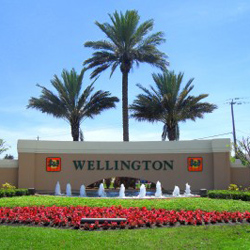BY ANNE CHECKOSKY
Business owners within 300 feet of residential properties in Wellington who want to keep operating after hours have until July 15 to file an application to do so without being charged. After then, an extended-hours-of-operation permit application will require a $500 fee.
The new code for these businesses sets indoor activity hours from 5 a.m. to midnight and outdoor activities from 6 a.m. to 11 p.m. Those wanting a later closing or an earlier opening will require a permit. In addition, business activities later than 2 a.m. will require Wellington Village Council approval.
Since the 60-day grace period for the extended-hours permit began back in May, seven businesses applied for and were granted extended-hours permits, said Bill Nemser, principal planner for the village.
“We were trying to be business-friendly and reasonable,” Nemser said regarding the grace period.
But the seven businesses that were approved weren’t just rubber-stamped, either. Each application was reviewed separately and some conditions were put in place, he said. For example, the application for one business was granted as long the owners agreed to cease outdoor service by 11 p.m.
In another example, parking would be for employees only after a certain time, Nemser said, adding that in all seven cases, the businesses were aware they were out of compliance with the old code.
Wellington Chamber of Commerce President Victor Connor is a little concerned, however, that not all businesses affected by the rules change are aware they are subject to it. He thought the 60-day grace period was on the short side.
Nemser doesn’t anticipate an influx of applications now that the grace period is ending because most businesses in Wellington can operate for 24 hours if they wish, but most of them don’t. This ordinance affects only those located within 300 feet of residential areas.
The new code also makes clear that business activities are defined as work with patrons. So, businesses owners who want to go into the office at 3 a.m. and catch up on work can do so, as long as the owner doesn’t bring clients onto the property, Nemser said.
Here is how the new language in the code reads: “As defined in Article 5, Chapter 12, for the purposes of this section, business activities shall consist of any and all activities which involve patrons of the business (either public or private activity) and do not include activities such as setup/prep, stocking or cleanup provided those activities comply with all other Wellington regulations.”
Connor is worried that distinction may be confusing for some businesses, especially accountants at tax time who may have clients at odd hours. How that will play out remains to be seen, he said.
At the May 17 council meeting, when the issue was last discussed, there was some debate among council members about the exemption in the rules for professional offices.
A motion was made at that meeting by Councilwoman Anne Gerwig to table the issue until the council could hear from business owners. “You can see how there would be circumstances that there would be someone there besides yourself, and you may be doing more than checking your e-mail,” she said then.
But her motion failed on a 3-2 vote.
Businesses that are denied an extended-hours permit can always appeal the decision, Nemser said.
The new code goes into effect July 15.








